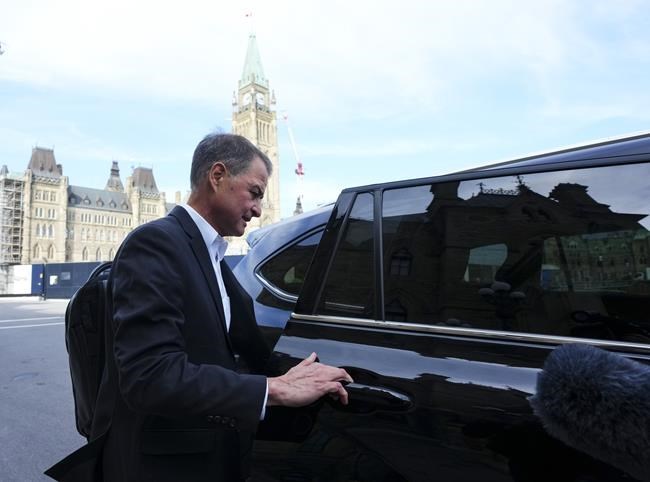OTTAWA — The House of Commons will vote for a new Speaker Tuesday in a rare mid-session election.
Steven Chaplin, a fellow at the University of Ottawa's Public Law Centre, said this is only the third time in Canadian history that a Speaker didn't complete their full term.
Anthony Rota resigned from the position last week amid controversy. He had invited parliamentarians, during a visit by Ukraine's president, to applaud a veteran who served in a Nazi unit in the Second World War.
The longest-serving member of the House, Bloc Québécois MP Louis Plamondon, was put in as an interim Speaker — a move Chaplin said is a first in Canada's history, but one that signals the House aims to rise above partisanship.
"It's unprecedented, but they've managed to work their way through a very orderly process and I think that says a lot about the House in many ways," Chaplin said Monday.
All members of Parliament, except for party leaders and ministers, are eligible to become the Speaker. And all of them are automatically on a list of candidates MPs can vote for. Those who don't want to be considered have until 6 p.m. on Monday to take their names off the list before Tuesday's vote.
Those left in the running are expected to deliver short speeches Tuesday about why they want the job. After the speeches, there will be a 30-minute break. Then, anonymous in-person voting begins on a ranked ballot.
A second vote would only happen to break a tie.
A handful of Conservative, Liberal and NDP MPs, along with Green Party Leader Elizabeth May, have indicated they want the role, which comes with a pay raise and an official residence known as The Farm.
But many others are not interested.
Most MPs who were asked about running for the Speaker's job politely declined, with several citing their lack of French skills as a key reason why they didn't see themselves in the role.
B.C. Liberal MP Ken Hardie openly laughed when asked if he'd run, quipping: "I thought you liked me?"
Thunder Bay Liberal Marcus Powlowski also chuckled when he said: "Am I interested in being speaker? No."
MPs are expected to back candidates based on their political affiliation, despite the Speaker remaining neutral once elected.
And with a Liberal minority government in place, that leaves lots of room for an opposition MP to take on the role.
Alberta Conservative MP Tom Kmiec said he plans to support Nova Scotia Conservative MP Chris d’Entremont, who has been the House of Commons deputy Speaker since 2021.
But some Liberals say they don't believe he is someone who can maintain order in the House, pointing to a ruling he made while presiding over debate last week.
During a heated question period following Rota's announcement last Tuesday that he would resign, Conservative deputy leader Melissa Lantsman called House leader Karina Gould a "disgrace" — twice.
The Liberals sought an apology, but d'Entremont instead ruled that MPs should refrain from using such words in the future, stopping short of calling it unparliamentary language.
Ontario Liberal MP Chris Bittle said he likes d'Entremont "a lot" but it was "disappointing to see what happened," as it seemed like he had lost control of the chair.
"If he wasn't going to stand up at that point, before an election, I don't know that he'll be able to defend the standing orders moving forward," Bittle told reporters later the same day.
Meanwhile, Conservatives are drumming up attacks against Quebec Liberal MP Greg Fergus, who also wants the Speaker role.
Jenni Byrne, a top adviser to Conservative Leader Pierre Poilievre, described Fergus as the prime minister's choice for Speaker in a post on X, formerly known as Twitter.
She pointed out that Fergusdefended Prime Minister Justin Trudeau after he inadvertently elbowed NDP MP Ruth Ellen Brosseau during an uproar in the House in 2016 — the incident known as "elbow-gate."
Alberta Conservative MP Michelle Rempel Garner also attacked Fergus because he had once been reprimanded by the ethics commissioner.
Fergus, as parliamentary secretary to the prime minister, had written a letter in support of a TV channel's application to the Canadian Radio-television and Telecommunications Commission for mandatory carriage.
But federal guidelines prohibit people with such roles from making such interventions with quasi-judicial tribunals, and Fergus was found to have breached the Conflict of Interest Act.
"He should not be Speaker," Rempel Garner said on X.
Two existing assistant deputy Speakers are vying for the role: the NDP's Carol Hughes, from Ontario, and Liberal Alexandra Mendes, from Quebec.
A handful of other Liberals have also signalled they are running, including Prince Edward Island MP Sean Casey and Quebec MPs Peter Schiefke and Stephane Lauzon.
Whoever is elected will assume the role immediately. But first they will have to make a show of reluctance as they are dragged to the chair by fellow MPs.
It's a tradition that pays homage to the Speakers in parliamentary tradition who risked execution in order to perform their roles.
"That's a historic thing because there was a period of time, and in fact there have been seven Speakers in the U.K. history who were executed over time," Chaplin said.
"Their main job is to speak on behalf of the House, so they were the people who would tell the King, 'No, you're not getting the legislation you wanted,' or, 'You're not going to get your way.'
"And sometimes the Speaker didn't return to the House."
This report by The Canadian Press was first published Oct. 2, 2023.
— With files from Mia Rabson.
Mickey Djuric, The Canadian Press
Note to readers: This is a corrected story. A previous version said this is only the second time in Canadian history that a Speaker didn't complete their full term.



